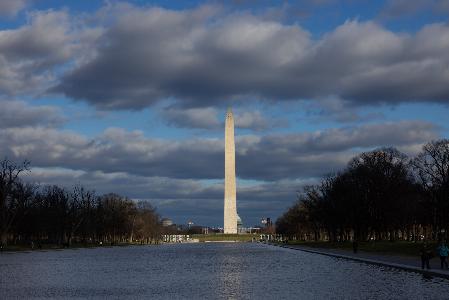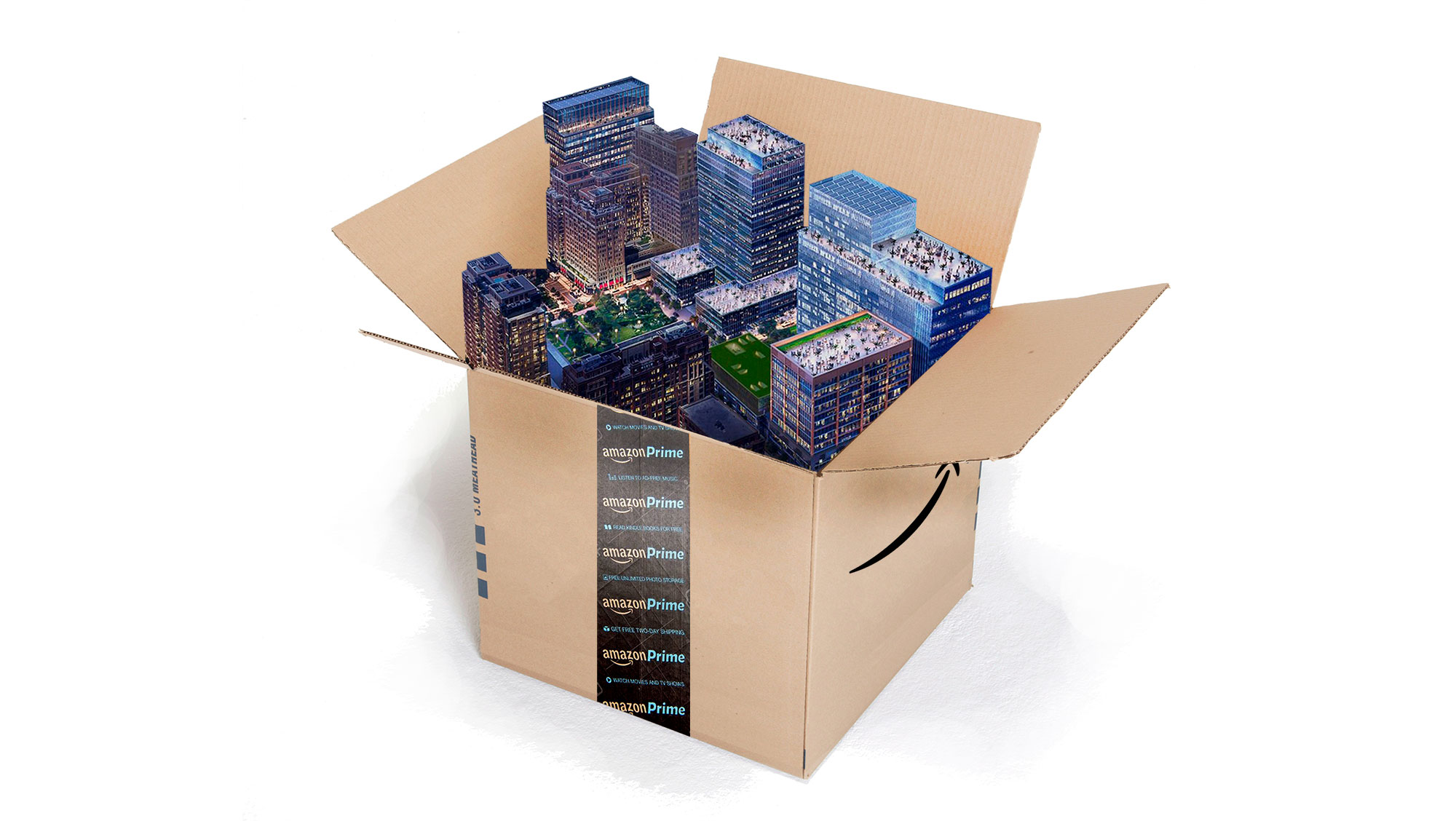You can only climb so gradually if you want to get to the top of a mountain.
And what the iconic ecommerce giant Amazon is conceiving of for its split second headquarters is as tall a peak as any in the region. Take a moment again to think about scale: if Amazon’s pledged 25,000 peak employee count had to be drawn from Arlington tomorrow, 11 percent of one of the Virginia’s largest cities would be a Jeff Bezos employee (based on Arlington’s current population of 225, 200 people).
Of course, the staffing is planned to happen over 12 years and after a year of breathless coverage of a rare, open-call to host a second headquarters of one of the most powerful companies of a generation, the DMV might well deserve its moment of celebration.
“The future looks bright. With the influx of educated, ambitious talent moving and settling down in the DC area, we’ll see lasting effects in terms of creating a pool of future change makers,” said Ahmad Ishaq, the founder and chief innovation officer of ByteCubed, a Crystal City-based tech and consultancy firm focused on reimagining the traditional GOVCON space.
But the introduction of a high-paying tech employer has sparked the question: what will Amazon HQ2 mean for the tech workforce in the Washington, D.C. Metro area?
Will it become a major boon for the region, attracting technologists from the rest of the world who might later end up at one of the region’s fast-growing startups or other corporate anchors? Will HQ2 make it easier for those same companies to recruit their own talent from other regions, since they know there is such a strong batch of additional employment opportunities?
Or will Amazon be seen as soaking up local tech employees, further complicating a historically tight labor market?
###
Big Tech in the Mid-Atlantic
Hank Thomas is supposed to know what the DMV needs for an even more dynamic economy. He’s the CEO and a partner of Strategic Cyber Ventures, a local D.C. VC focused on helping former feds make it as cybersecurity entrepreneurs. He hears the nerves but sees the future differently.
“Any potentially short term negative effects to the talent pool would be rapidly overshadowed by the fact that a tech company that is revolutionizing the way we live and work is planting itself inside the still government–focused Beltway,” he said. “Awesome things will then grow and then orbit around Amazon. D.C.’s technology ecosystem will flourish.”
The long-term benefits of adding a major office for one of this era’s major tech brands seems obvious. The possibility of having influential executives here for Amazon is something different than the lobbyists and government affairs execs that other firms keep in D.C. Big tech companies like Apple, Google, Facebook and Twitter already have D.C. offices, as consumer tech has become a major regulatory concern. Last year, D.C. tech seemed to cheer the announcement that Yelp was bringing more than 500 sales and marketing jobs, but they, too, weren’t quite the executives or engineers that excite today.
Amazon HQ2 is perceived to be something different – a true second headquarters for the company that might become one of the economy’s most regulated. But an advanced corporate culture doesn’t make an innovation economy alone.
Look no farther than sleepy Delaware. That state won the economic development bonanza of the 1980s by becoming a hub of the nascent credit card industry, backed by legislation written by execs at JP Morgan and Chase, spawning the major satellite offices of the the day. The banking sector still employs thousands of residents there, including the massive 4,000-person Delaware Technology Center from JP Morgan Chase. But if you ask Delaware startuppers, there’s some sense that the big banks have long offered such stable jobs that no entrepreneurial identity has flourished. Last year our sister site Technical.ly Delaware published its annual list of startups we were following in the First State and asked the question: where is all the fintech?
Our newsroom hears similar concerns with Maryland’s cybersecurity sector, which keeps its share of technologists locked into comfy, if boring, positions. In the ensuing years, Amazon is planning to become the region’s largest private employer. So will Amazon just be another lifetime sentence for professionals with technical chops?
That is causing some local entrepreneurs and hiring managers night stresses.
One founder was heard sharing that Amazon was planning in the coming months to retain 100 recruiters. It’s a number that sounds like a scene from the tech startup version of The Illiad. Another gushed about perks they couldn’t compete with. Many do seem to express long-term enthusiasm but can’t shake their short-term fears, of fast-rising compensation packages and lost top-flight talent.
Others are more vocally supportive.
“Yes, we’ll have to compete for talent, but competition forces us all to be better,” said Ishaq of ByeCubed, which has more than 120 employees. “I’m not so worried about poaching talent. People will cycle in and out of Amazon.”
And Ishaq would have reason to worry. His office is just a few short miles from HQ2, which will be plotted in National Landing, a real estate name new enough that this reporter hears plenty of sniffling at the new branding. The expansive plot encompasses Crystal City, the eastern portion of Pentagon City and the northern portion of Potomac Yard in Northern Virginia, according to its website. The space is needed, to develop a campus for 25,000 full-time jobs, $2.5 billion in Amazon investment and four million square feet of energy- efficient office space for each location.
Kestrel Linder, CEO and cofounder of D.C.–based, 20-person startup GiveCampus, a fundraising platform for schools, is also thinking about the competition. He, too, says he is not threatened, thinking the experience at a small tech company is so vastly different than a tech behemoth.
“Smaller, high-growth companies offer professional opportunities that large companies can’t. At a smaller, high-growth company, you have the opportunity to assume greater responsibilities, take more ownership, and have much more significant and direct impact, regardless of how experienced you are or where you went to school,” Linder told us. “There’s also almost always more room for rapid career growth and development. And those types of opportunities are perishable.”
Tech Talent’s Rising Role in the DMV Economy
It’s also worth remembering that Amazon said it chose Northern Virginia in part because of the pool of talent that’s already here. When searching for its second headquarters location, the tech giant said it was “looking for a location with strong local and regional talent—particularly in software development and related fields—to continue hiring and innovating on behalf of our customers.”
According to the Bureau of Labor Statistics, the DMV is the second highest metropolitan area with the highest employment level for software developers working with systems software with 22,780 employees, making a median of $124,230 a year. Virginia has the second highest concentration of jobs and location quotients in this occupation, with 24,650 jobs, and is the fifth highest paying state for this occupation with a median annual wage of $121,560. These stats are based off of software developers who research, design, develop, and test operating systems-level software, compilers and network distribution software for medical, industrial, military, communications, aerospace, business, scientific and general computing applications, the bureau said on its site.
For software developers who develop, create and modify general computer applications software or specialized utility programs, Virginia has the fifth highest concentration of jobs and location quotients in this occupation with 35,960 jobs and the District is the third top paying state for this occupation with a median annual wage of $115,900, the bureau shows. The DMV employs 28,820 software developers working with applications, which is a little more than those working with systems software.
The second headquarters appears poised to increase those totals, and there are incentives for the company to follow through. If Amazon creates the forecasted 25,000 jobs for Arlington, the company will receive performance-based direct incentives of $573 million and Virginia agreed to give Amazon a workforce cash grants of $22,000 per job created over the next 12 years, which adds up to $550 million for the total amount, the Washington Post reported.
Boosters even say that those kinds of corporate jobs at a company like Amazon mark a transition between the region’s stuffy government contractors and next-generation startup culture.
That’s what Strategic Cyber Ventures’ Thomas says. He thinks the ecommerce giant will force people to “leave their government bubbles and silos,” speeding a move toward a tech-enabled shift that was already in motion. Before Amazon made its second HQ announcement, D.C. was already becoming a hot spot for millennials to live and work; WalletHub via a CNBC article actually ranked D.C. the number one place for millennials in April based on affordability, quality of life, education and health, economic health and civic engagement.
“It’s really becoming a place to be, especially as quality of life in downtown San Francisco continues to deteriorate and The Valley continues to become prohibitively regulated and expensive to operate from,” Thomas said.
This tech-forward corporate footprint can do what no number of bit-sized startups can, which is attract the attention of larger scale training programs. For example, Virginia Tech and George Mason University have made plans to expand their computer science and software engineering-focused programs with remote campuses in NoVa, near Amazon’s second HQ (more on that in a follow up story to come).
Across interviews, even the most positive seem to admit that bringing in such a giant will surely create growing pains. But there is a hopefulness in many this reporter spoke to, something different than the overwhelming fears seeming to come from Queens, where the second half of the split Amazon HQ2 is due to land.
Join the conversation!
Find news, events, jobs and people who share your interests on Technical.ly's open community Slack

DC daily roundup: Tyto Athene's cross-DMV deal; Spirit owner sells to Accenture; meet 2GI's new cohort

DC daily roundup: $10M to streamline govt. contracting; life sciences might dethrone software; Acadia's new $50M

DC daily roundup: the DMV's VC cooldown, SmartSigns for safer driving; Rep. Schiff's AI copyright bill


